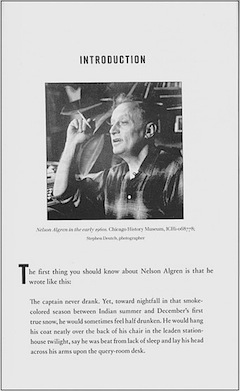Finally, The New York Times Weighs In
Nearly three months after Colin Asher’s biography of Nelson Algren was published, and just in time for readers to take a break from serious books as they head off on vacation to escape the summer heat, our dearly beloved newspaper of record has deigned to take notice of Never a Lovely So Real. But let’s put that aside because Susan Jacoby’s review, which will appear Sunday in the print edition of The New York Times Book Review, is not only honest, clear, and well reported, it sets a judicious standard. Which gives it credibility.
While it’s not a sexy review—Asher already has one of those; I’m thinking of Jonathan Dell’s admiring take in The New Yorker, which is unbeatable—not sexy is entirely understandable. Anyone seriously reviewing the book after Dell has to do it differently. And Jacoby is certainly serious. She reports what’s in the biography rather than moralizes about it, unlike Joseph Epstein’s screed in Commentary, and she “gets” Algren as well as Vivian Gornick’s lengthier sympathetic piece in The New Republic.
Jacoby admires the “luminous title” of the biography and points out that Asher “scrupulously attempts to separate facts from myths (some created by Algren himself) as he explores how a writer who produced prose-poetry of such a high order could now be largely forgotten.” And she recaps neatly:
Algren led a big life that included such diverse experiences as immersion, while a student at the University of Illinois, in the Stoicism of Marcus Aurelius; conviction for stealing a typewriter, which elicited the mercy of probation from a small-town Texas jury sympathetic to the argument that the defendant was like a carpenter who could not afford his tools; interaction with the Communist Party as a member of the “proletarian” school of American writers; F.B.I. surveillance personally authorized by J. Edgar Hoover; three marriages (two to the same woman); and a trans-Atlantic romance with Simone de Beauvoir.

Jacoby dismisses the pernicious idea, still popular with some critics, that Algren was a categorically proletarian writer who fell short because he fell in line: “No writer in thrall to strict leftist ideology could ever have depicted a character like the ill-fated card dealer and drug addict Frankie Machine in “Golden Arm’ …”
She notes that Asher “chronicles meticulously the kind of government intrusions whose petty cruelty can still shock,” which might lead you to think that Never a Lovely So Real is a dry recitation of detail. To the contrary,
The literary gossip in this biography, much of it drawn from letters, is intriguing, witty and sometimes acidic. After “Golden Arm,” Ernest Hemingway wrote Algren a letter comparing him favorably to “the fading Faulkner” and “that overgrown Lil Abner Thomas Wolfe.” Against this backdrop, Hemingway wrote, Algren “comes like a corvette or even a big destroyer when one of those things is what you need and need it badly and at once and for keeps.”
But what I appreciate most about Jacoby’s review, precisely because of its level-headed fairness, is her putdown of one of Algren’s main detractors,
Norman Podhoretz, [who] in a 1956 New Yorker essay titled “The Man With the Golden Beef,” described Algren as a miscreant who believed that “we live in a society whose bums and tramps are better men than the preachers and the politicians and the otherwise respectables.” Respectable to whom? Podhoretz seemed furious at the idea that the wretched of the earth might not be wholly responsible for their wretchedness.
You can be sure that when Commentary ran Epstein’s screed under the headline “The Man With the Leaden Ear,” the magazine’s current editor John Podhoretz had the essay by Podhoretz père, Commentary’s founding editor, in mind. Which is too much like father like son. Ironically, every time Epstein illustrates his screed with a quotation from Algren’s writing to prove his point, he disproves it.






Dear Jan,
My name is Alice and I am working on an exhibition project on the Something Else Press. I am organizing a conference with Christian Xatrec at The Emily Harvey Foundation. We contacted you over email but never heard back from you. We are afraid we might have the wrong address. If you read this comment, would you kindly send me an email so that I could explain in more details the reason why we reached out?
I look forward to hearing from you soon.
Thanks and best,
Alice